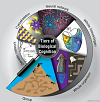
SENS5 - Rebalancing the aging T-cell pool to improve resistance to infection in the old age
Main Video
© SENS Foundation 2011 - http://www.sens.org
The Fifth SENS conference - Janko Nikolich-Zugich
Author:
J. Nikolich-Zugich
University of Arizona
Aging is associated with an increased susceptibility of older individuals to new and emerging infections; poor responses to vaccination compound this vulnerability. These problems may be further exacerbated in individuals with lifelong persistent viral infections, and human studies have highlighted an association between the Herpesvirus infections (most notably the cytomegalovirus, CMV) and pronounced signs of immune aging. In both mouse and man, repeated interactions between reactivating viruses such as CMV and antiviral T cells leads to memory T-cell inflation (MI) with increasing accumulation of these cells over the lifespan. It was hypothesized that MI may exact a price for the immune system: competition between inflating, CMV-specific memory T-cells and naïve T-cells supposed to defend against all other infections may impair the maintenance of a diverse naïve T-cell pool, consequently leaving the individual at a disadvantage when exposed to a new pathogen. We have directly tested this hypothesis using a mouse model of lifelong persistent infection. Young mice were infected with different herpresviruses, and then monitored for MI until age 20 months before challenge with Listeria monocytogenes. Subsets of each cohort underwent therapeutic interventions including: (1) antiviral treatment; (2) partial lymphocyte depletion to make space for new T-cells, (3) Kepivance/KGF to increase new T-cell generation, or (4) young naïve T-cell infusion in attempts to "rebalance" the naïve T-cell repertoire. In this model, lifelong persistent viral infection did not further impair the reduced bacterial clearance or magnitude of the anti-Listeria response in old mice, however, it altered the effector cytokine profiles of Listeria-specific T cells. Several types of treatment modestly restored the appropriate effector cytokine profiles. Importantly, young T-cells infused into aged recipients showed a "young" cytokine profile, indicating the aged environment can support their effector development. Implications of these interventions for future strategies to improve the quality of immune responses and resistance to infection in aged individuals will be discussed.
Other videos from BioScience
-

American Chemical Soci...
By: caliban
20 December 2019 - 11:47 AM -

Bioelectric Computatio...
By: Mind
12 December 2018 - 10:39 PM -

Bioelectric Computatio...
By: Mind
12 December 2018 - 10:39 PM -

The first head transpl...
By: caliban
04 March 2015 - 12:31 AM -

A Monkey Head Transplant
By: caliban
03 March 2015 - 11:12 PM -

NAD and Age reversal pt 4
By: to age or not to age
26 August 2014 - 06:49 PM -

NAD and age reversal pt 3
By: to age or not to age
26 August 2014 - 06:47 PM -

David Sinclair Intervi...
By: YOLF
17 March 2014 - 10:23 AM -

Caleb Finch
By: caliban
08 May 2012 - 09:14 AM -

SENS5 - The Future of...
By: jdgauchat
21 December 2011 - 07:44 PM








































